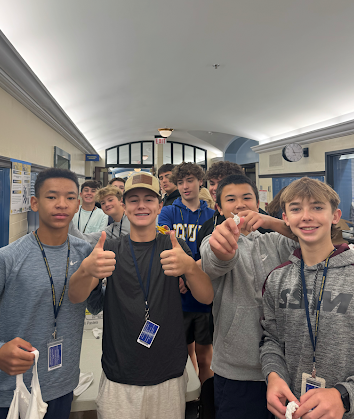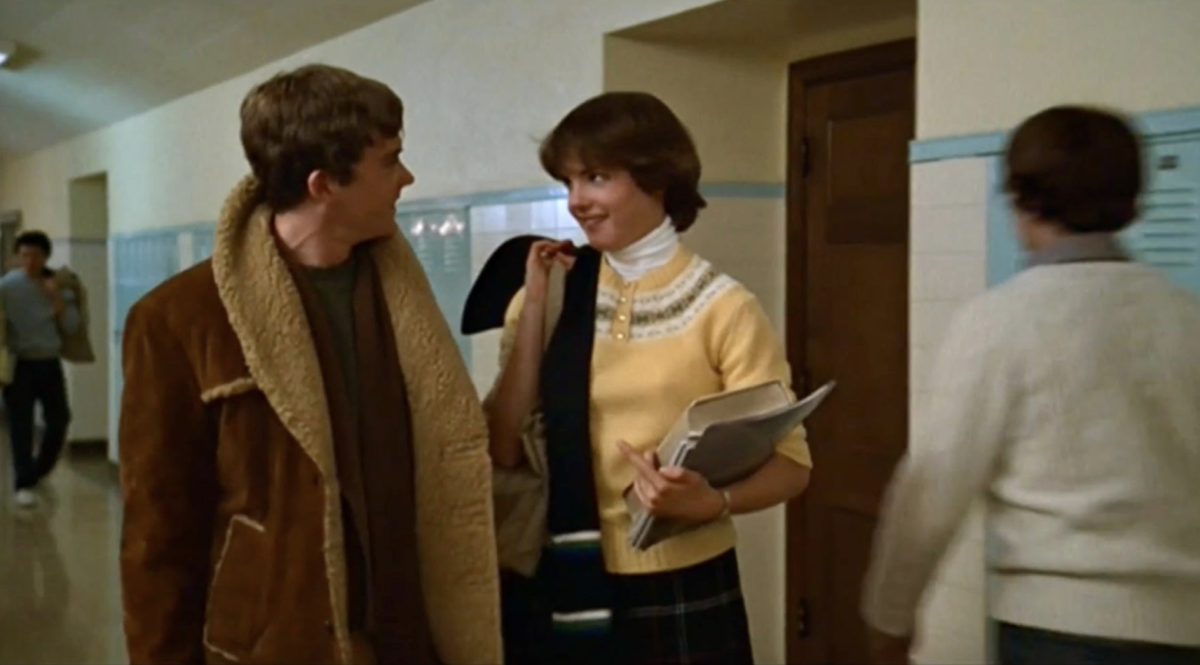Almost every Lake Forest resident has driven by and been both startled and amazed, at the sight of a pickup truck with dogs cruising in the back. Many know of the iconic Samoyed Show Dogs, but most don’t know of the man behind the wheel: Mark Litzsinger.
Litzsinger grew up in Hinsdale, graduating from Hinsdale Central High School in 1974. A phenomenal tennis player, Litzsinger played on two state championship tennis teams. He then took his talents to Texas Christian University where he played tennis his first two years before deciding to focus on his job.
Starting at the bottom of his family company, Litzsinger’s job was to drive the van and deliver things like staplers and tape to different store departments. Throughout college, Litzsinger was a member of Phi Kappa Sigma where he eventually became the president of his fraternity. Litzsinger graduated from TCU with a speech communications degree and a minor in business.

After graduating, Litzsinger became even more involved in his family’s company. The Follett Corporation, a provider of educational services and products to colleges, schools, and libraries, was started by Litzsinger’s great-grandfather in 1873.
Working for Follett, as Litzsinger says, “was the natural thing for me to do,” especially with his father growing the college bookstore business exceptionally. Litzsinger got to choose where he wanted to do management training, so he took his brand new Corvette out to California and began his career.
However, one morning, four to six months out in California, Litzsinger says he woke up and didn’t feel well mentally. He immediately went to see a psychiatrist, who tried to use hypnosis on him but he couldn’t figure out what was really bugging him.
“I thought I was just homesick,” Litzsinger said. So, he transferred closer to home and attended the University of Illinois Urbana Champaign, continuing to work while also advising his fraternity. As a result, the bad feeling that had previously lingered seemingly went away.
Unfortunately, three years later, now working as the assistant manager of the bookstore, the ill feeling came back.
“I didn’t know what it was, but I knew it wasn’t physical,” Litzsinger said.
Luckily, one of his family friends was a psychiatrist. Litzsinger called him and asked if he could come up to see him. Within 15 minutes of his visit, the psychiatrist determined he had depression, a genetic trait from his great-grandfather. Litzsinger called his dad who instantly became his biggest support mechanism. His dad made him an appointment at RUSH University Medical Center. Resuming his work at his company’s new bookstore at Northwestern University, he began a fresh start with new coworkers and employees while seeing his doctor once or twice a week.
Within six months, Litzsinger came out of his depression. However, his initial doctor decided he was going to South Dakota, so Litzsinger was introduced to Doctor Bill Schefter. Schefter had seen him during his very worst times and became Litzsingers mentor throughout his journey.
Litzsinger climbed the ladder of his family’s company and eventually became the chairman of the board. Over the years of Litzsinger as chairman, the Follett Corporation grew from a $1 billion company to a $2.7 billion company.
At 47 years old, Litzsinger began dating a woman from Kenilworth. After dating for two years, Litzsinger had known to prioritize his mental health and break it off because of his struggle with obsessive compulsiveness. Unfortunately, none of his old medications were working. Litzsinger, along with Dr. Schefter, decided that shock therapy was the next best step. Litzsinger went through four to five major shock therapy treatments and says it ended up being the smartest decision he had ever made. After therapy, Litzsinger was interested in things that he hadn’t really thought about before.
“It was like my mind was working a thousand miles an hour,” said Litzsinger.
Litzsinger was not embarrassed by what he had experienced. He told RUSH Medical Center, “If they ever do seminars [he] would share [his] story.”
The second time Litzsinger ever opened up about his journey was at a country club in Glencoe full of RUSH customers and patients. Litzsinger was very disappointed to hear that most people came to RUSH as their last “hurrah” after going everywhere else. Litzsinger then spoke about his struggles and life story.
“People couldn’t believe that I was even alive,” Litzsinger said. His brother was amazed by the audience’s feedback and urged Litzsinger to write a book about his life.

Litzsinger had pondered on the idea of writing for about a year. He eventually called a friend from Lake Bluff who referred him to ghostwriter Sarah Hamaker, who was very intrigued by Litzsinger’s story and began the writing process. Interviewing Litzsinger’s family, doctors, and friends, the framework of the book all began to click.
Hamaker would write a chapter, send it to Litzsigner, and Litzsinger would make all the necessary changes. It took a year of writing but eventually Climbing Toward the Light was published and is selling at bookstores and on Amazon. Litzinger started speaking to college campuses, the National Association of Mental Health, and small groups and big groups, all on his own time with his own expenses. Since then, he has updated the book twice. His last edition was done during the pandemic where he discussed how dangerous phones are for the youth and how many teens are not learning the important skill sets they need for life.
On one random weekend, Litzsinger was invited to a play about a dysfunctional family by a couple whose family had struggled with mental health issues. In the play, the daughter was really struggling and needed to get shock therapy. Litzsinger was horrified by the way the play depicted shock therapy— animated with lighting and bolts. This astonishing scene stuck with Litzsinger as he thought the show was destructive about depression and would turn people off from getting the help and therapy that they needed.
Litzsinger decided there needed to be a better portrayal of overcoming mental illnesses and called his ghostwriter Hamaker asking if it was possible to turn his story into a play or a movie.
A week later, Lizsinger was in Boulder, Colorado. He had gone on a date with a girl who coincidentally had just been at a film festival two hours before their dinner. Litzsinger sent her a copy of his book, not expecting much out of it. Sure enough, she sent the book to a film company and the company agreed that a great movie could be made out of it. A screenplay writer, Jenny Halper, became heavily interested in writing the script for the movie.
So Litzsinger took her to Hinsdale, where he grew up, so she could get a good sense of Litzsinger’s life. They then found a director who had some mental health issues and thought she would be the perfect fit to direct the movie. Finally, it was time to find an actor to play Litzsinger. After going through over seventy actors, Ashton Kutcher is among the top picks to be cast. This four to five-million-dollar movie is still in the process of being made but hopefully will be out within the next couple of years.
Although Litzsinger is occupied with his movie, he has also had many recent accomplishments. Litzsinger has recently been awarded Alumni of the Year for his fraternity and has just been put into his high school’s Hall of Fame. Litzsinger is also busy with showing his dogs in competitions.
This past week, his male dog won best of breed and is on his way to gaining his grand championship, though already a bronze grand champion. Litzsinger is also very generous, donating $150,000 to TCU’s tennis team, $50,000 to Rovers Food Bank, $25,000 to St. Judes, and $25,000 to Lurie Children’s Hospital, and is still planning on donating more in the future. Litzsinger also has bigger dreams of building state-of-the-art mental hospitals in every state so everyone has access to the help they need.
So, the next time you drive past the truck and the dogs bring a smile to your face, take a moment to think about the man behind the wheel.








